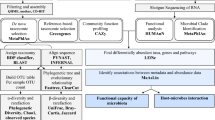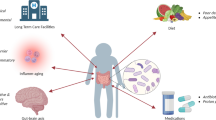Abstract
Although physiologic and neurologic consequences of micronutrient deficiencies have been addressed extensively, less is known about their impact on developing gut microbiota. Vitamin B12 deficiency is a common micronutrient deficiency in infants. We aimed to analyze the gut microbial composition of exclusively breastfed infants aged between 4 and 6 months with and without vitamin B12 deficiency by 16S rRNA gene sequencing. In a subgroup of infants with vitamin B12 deficiency, stool samples are recollected and reanalyzed after vitamin B12 supplementation. A total of 88 infants’ stool samples (median age 4 months [IQR 4–5], 50% males) were analyzed, of which 28 (31.8%) were vitamin B12 sufficient and 60 (68.2%) were vitamin B12 insufficient. Comparisons between vitamin B12-sufficient and vitamin B12-insufficient infants revealed no evidence of differences in the microbiota. Proteobacteria, Firmicutes, Actinobacteria, and Bacteroidetes were the most abundant phyla in all groups. There was no difference between the pre- and post-treatment composition of gut microbiota.
Conclusion: Vitamin B12-deficient infants have similar gut microbial composition as vitamin B12-sufficient infants. Since the samples were collected at an early period of life and the exposure to deficiency was relatively short, it may be possible that the effects were not fully established.
What is Known: • Vitamin B12 is an essential vitamin for humans and also a crucial compound for human gut microbiota. • Vitamin B12 deficiency is common in exclusively breastfed infants. • In contrast to the adult gut microbiota, infant gut microbiota has been shown to have decreased capacity for de novo synthesis of vitamin B12 and depend on dietary source of vitamin B12. | |
What is New: • There is no difference in the gut microbial composition of vitamin B12-deficient and vitamin B12-sufficient infants. |







Similar content being viewed by others
Abbreviations
- FDR:
-
False discovery rate
- OTU:
-
Operational taxonomic unit
- PCoA:
-
Principal coordinate analysis
References
Allen L (2009) How common is vitamin B-12 deficiency? Am J Clin Nutr 89:693S–696S. https://doi.org/10.3945/ajcn.2008.26947A
Andrès E, Loukili NH, Noel E, Kaltenbach G, Abdelgheni MB, Perrin AE, Noblet-Dick M, Maloisel F, Schlienger JL, Blicklé JF (2004) Vitamin B12 (cobalamin) deficiency in elderly patients. CMAJ 171:251–259
Arrieta MC, Stiemsma LT, Amenyogbe N, Brown EM, Finlay B (2014) The intestinal microbiome in early life: health and disease. Front Immunol 5:427. https://doi.org/10.3389/fimmu.2014.00427
Biesalski HK (2016) Nutrition meets the microbiome: micronutrients and the microbiota. Ann N Y Acad Sci 1372:53–64. https://doi.org/10.1111/nyas.13145
Blanton LV, Charbonneau MR, Salih T et al (2016) Gut bacteria that prevent growth impairments transmitted by microbiota from malnourished children. Science 351:aad3311. https://doi.org/10.1126/science.aad3311
Bokulich NA, Chung J, Battaglia T et al (2016) Antibiotics, birth mode, and diet shape microbiome maturation during early life. Sci Transl Med 8:343ra82. https://doi.org/10.1126/scitranslmed.aad7121
Boran P, Yildirim S, Karakoc-Aydiner E, Ogulur I, Ozen A, Haklar G, Koc A, Akkoc T, Barlan I (2016) Vitamin B12 deficiency among asymptomatic healthy infants: its impact on the immune system. Minerva Pediatr Jan 13 [Epub ahead of print]
de Benoist B (2008) Conclusions of a WHO technical consultation on folate and vitamin B12 deficiencies. Food Nutr Bull 29:S238–S244. https://doi.org/10.1177/15648265080292S129
Degnan PH, Taga ME, Goodman AL (2014) Vitamin B12 as a modulator of gut microbial ecology. Cell Metab 20:769–778. https://doi.org/10.1016/j.cmet.2014.10.002
Dostal A, Lacroix C, Pham VT, Zimmermann MB, Del'homme C, Bernalier-Donadille A, Chassard C (2014) Iron supplementation promotes gut microbiota metabolic activity but not colitis markers in human gut microbiota-associated rats. Br J Nutr 111:2135–2145. https://doi.org/10.1017/S000711451400021X
Dror DK, Allen LH (2008) Effect of vitamin B12 deficiency on neurodevelopment in infants: current knowledge and possible mechanisms. Nutr Rev 66:250–255. https://doi.org/10.1111/j.1753-4887.2008.00031.x
Eggesbø M, Moen B, Peddada S, Baird D, Rugtveit J, Midtvedt T, Bushel PR, Sekelja M, Rudi K (2011) Development of gut microbiota in infants not exposed to medical interventions. APMIS 119:17–35. https://doi.org/10.1111/j.1600-0463.2010.02688.x
Goraya JS, Kaur S, Mehra B (2015) Neurology of nutritional vitamin B12 deficiency in infants: case series from India and literature review. J Child Neurol 30:1831–1837 https://doi.org/10.1177/0883073815583688
Halicioglu O, Sutcuoglu S, Koc F, Ozturk C, Albudak E, Colak A, Sahin E, Asik Akman S (2012) Vitamin B12 and folate statuses are associated with diet in pregnant women, but not with anthropometric measurements in term newborns. J Matern Fetal Neonatal Med 25:1618–1621. https://doi.org/10.3109/14767058.2011.648244
Hibberd MC, Wu M, Rodionov DA et al (2017) The effects of micronutrient deficiencies on bacterial species from the human gut microbiota. Sci Transl Med 9:eaal4069 https://doi.org/10.1126/scitranslmed.aal4069
Hill CJ, Lynch DB, Murphy K, Ulaszewska M, Jeffery IB, O'Shea CA, Watkins C, Dempsey E, Mattivi F, Tuohy K, Ross RP, Ryan CA, O' Toole PW, Stanton C (2017) Evolution of gut microbiota composition from birth to 24 weeks in the INFANTMET Cohort. Microbiome 5:4. https://doi.org/10.1186/s40168-016-0213-y
Hunt A, Harrington D, Robinson S (2014) Vitamin B12 deficiency. BMJ 349:g5226. https://doi.org/10.1136/bmj.g5226
Irevall T, Axelsson I, Naumburg E (2017) B12 deficiency is common in infants and is accompanied by serious neurological symptoms. Acta Paediatr 106:101–104. https://doi.org/10.1111/apa.13625
Jaeggi T, Kortman GA, Moretti D, Chassard C, Holding P, Dostal A, Boekhorst J, Timmerman HM, Swinkels DW, Tjalsma H, Njenga J, Mwangi A, Kvalsvig J, Lacroix C, Zimmermann MB (2015) Iron fortification adversely affects the gut microbiome, increases pathogen abundance and induces intestinal inflammation in Kenyan infants. Gut 64:731–742 https://doi.org/10.1136/gutjnl-2014-307720
Koc A, Kocyigit A, Soran M, Demir N, Sevinc E, Erel O, Mil Z (2006) High frequency of maternal vitamin B12 deficiency as an important cause of infantile vitamin B12 deficiency in Sanliurfa province of Turkey. Eur J Nutr 45:291–297
Lim ES, Wang D, Holtz LR (2016) The bacterial microbiome and virome milestones of infant development. Trends Microbiol 24:801–810. https://doi.org/10.1016/j.tim.2016.06.001
Mach N, Clark A (2017) Micronutrient deficiencies and the human gut microbiota. Trends Microbiol 25:607–610. https://doi.org/10.1016/j.tim.2017.06.004
Milani C, Duranti S, Bottacini F et al (2017) The first microbial colonizers of the human gut: composition, activities, and health implications of the infant gut microbiota. Microbiol Mol Biol Rev 81:e00036–e00017. https://doi.org/10.1128/MMBR.00036-17
Odamaki T, Kato K, Sugahara H, Hashikura N, Takahashi S, Xiao JZ, Abe F, Osawa R (2016) Age-related changes in gut microbiota composition from newborn to centenarian: a cross-sectional study. BMC Microbiol 16:90. https://doi.org/10.1186/s12866-016-0708-5
Oksanen J, Blanchet FG, Friendly M et al (2017) Vegan: Community Ecology Package. R package version 2.4-3. 2017
Pannaraj PS, Li F, Cerini C et al (2017) Association between breast milk bacterial communities and establishment and development of the infant gut microbiome. JAMA Pediatr 171:647–654. https://doi.org/10.1001/jamapediatrics.2017.0378
Prado EL, Dewey KG (2014) Nutrition and brain development in early life. Nutr Rev 72:267–284. https://doi.org/10.1111/nure.12102
Rutayisire E, Huang K, Liu Y, Tao F (2016) The mode of delivery affects the diversity and colonization pattern of the gut microbiota during the first year of infants’ life: a systematic review. BMC Gastroenterol 16:86. https://doi.org/10.1186/s12876-016-0498-0
Simonyté Sjödin K, Domellöf M, Lagerqvist C, Hernell O, Lönnerdal B, Szymlek-Gay EA, Sjödin A, West CE, Lind T (2018) Administration of ferrous sulfate drops has significant effects on the gut microbiota of iron-sufficient infants: a randomised controlled study. Gut [Epub ahead of print] https://doi.org/10.1136/gutjnl-2018-316988
Stanislawski MA, Dabelea D, Wagner BD, Iszatt N, Dahl C, Sontag MK, Knight R, Lozupone CA, Eggesbø M (2018) Gut microbiota in the first 2 years of life and the association with body mass index at age 12 in a Norwegian birth cohort. MBio 9:e01751–e01718. https://doi.org/10.1128/MBIO.01751-18
Stewart CJ, Ajami NJ, O'Brien JL, Hutchinson DS, Smith DP, Wong MC, Ross MC, Lloyd RE, Doddapaneni H, Metcalf GA, Muzny D, Gibbs RA, Vatanen T, Huttenhower C, Xavier RJ, Rewers M, Hagopian W, Toppari J, Ziegler AG, She JX, Akolkar B, Lernmark A, Hyoty H, Vehik K, Krischer JP, Petrosino JF (2018) Temporal development of the gut microbiome in early childhood from the TEDDY study. Nature 562:583–588 https://doi.org/10.1038/s41586-018-0617-x
Tang M, Frank DN, Hendricks AE, Ir D, Esamai F, Liechty E, Hambidge KM, Krebs NF (2017) Iron in micronutrient powder promotes an unfavorable gut microbiota in Kenyan infants. Nutrients 9:776. https://doi.org/10.3390/nu9070776
Wopereis H, Oozeer R, Knipping K, Belzer C, Knol J (2014) The first thousand days—intestinal microbiology of early life: establishing a symbiosis. Pediatr Allergy Immunol 25:428–438. https://doi.org/10.1111/pai.12232
Yatsunenko T, Rey FE, Manary MJ, Trehan I, Dominguez-Bello MG, Contreras M, Magris M, Hidalgo G, Baldassano RN, Anokhin AP, Heath AC, Warner B, Reeder J, Kuczynski J, Caporaso JG, Lozupone CA, Lauber C, Clemente JC, Knights D, Knight R, Gordon JI (2012) Human gut microbiome viewed across age and geography. Nature 486:222–227. https://doi.org/10.1038/nature11053
Funding
This project was sponsored by Marmara University Scientific Research Commission, BAPKO, (SAG-A-091116-0488).
Author information
Authors and Affiliations
Contributions
P. Boran, E. Kepenekli, C. Erzik, and A. Soysal designed the study.
P. Boran and HE. Baris participated in recruitment of subjects and sample collection.
P. Boran, HE. Baris, C. Erzik, and DM. Dinh performed data analysis and interpretation.
DM. Dinh generated figures.
P. Boran and HE Baris wrote the first draft of the article.
P. Boran, HE Baris, E Kepenekli, C. Erzik, A. Soysal, and DM Dinh contributed to critical revision and approved the final manuscript.
Corresponding author
Ethics declarations
Conflict of interest
The authors declare that they have no conflict of interest
Ethical approval
All procedures performed in studies involving human participants were in accordance with the ethical standards of the institutional and/or national research committee (Marmara University, School of Medicine Ethics Committee, reference number: 09.2016.137) and with the 1964 Helsinki Declaration and its later amendments or comparable ethical standards.
Informed consent
Informed consent was obtained from mothers of all individual participants included in the study.
Additional information
Communicated by Mario Bianchetti
Publisher’s note
Springer Nature remains neutral with regard to jurisdictional claims in published maps and institutional affiliations.
Electronic supplementary material
ESM 1
(DOCX 1974 kb)
Rights and permissions
About this article
Cite this article
Boran, P., Baris, H.E., Kepenekli, E. et al. The impact of vitamin B12 deficiency on infant gut microbiota. Eur J Pediatr 179, 385–393 (2020). https://doi.org/10.1007/s00431-019-03517-2
Received:
Revised:
Accepted:
Published:
Issue Date:
DOI: https://doi.org/10.1007/s00431-019-03517-2




